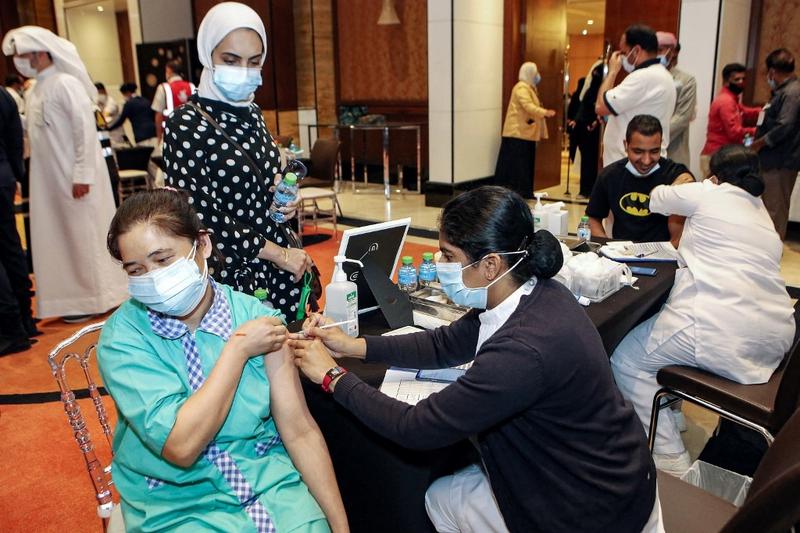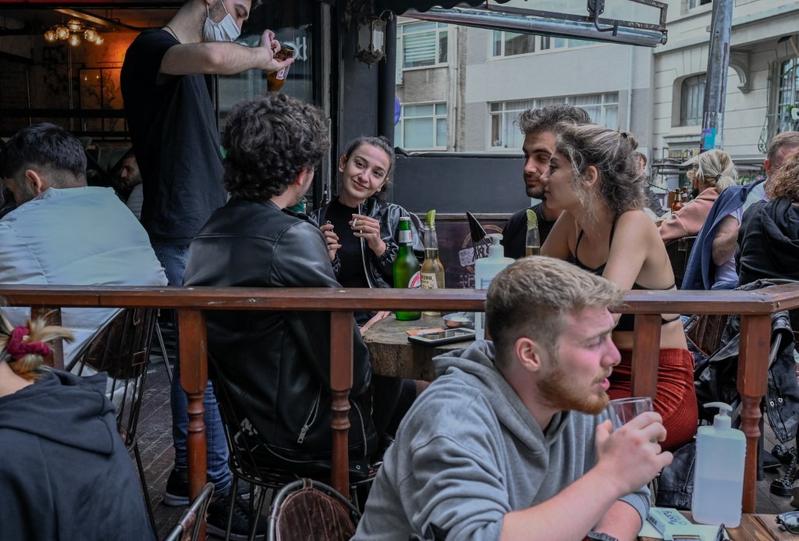 In this undated file photo, a staff member shows CoronaVac vaccine vials at Sinovac Life Sciences in Beijing. (PHOTO BY CHEN XIAOGEN / FOR CHINA DAILY)
In this undated file photo, a staff member shows CoronaVac vaccine vials at Sinovac Life Sciences in Beijing. (PHOTO BY CHEN XIAOGEN / FOR CHINA DAILY)
JERUSALEM / PHNOM PENH / NEW DELHI / SYDNEY / TEHRAN / TOKYO / KUWAIT CITY / VIENTIANE / BEIRUT / KUALA LUMPUR / ULAN BATOR / KATHMANDU / WELLINGTON / ISLAMABAD / SINGAPORE / SEOUL / MANILA / ANKARA / HANOI - Singapore will allow the use of Sinovac Biotech Ltd’s COVID-19 vaccine, after the World Health Organization approved the drug as part of its emergency use listing.
The move means the drug can be administered by private health care providers as part of a program that allows the use of unregistered COVID-19 vaccines, the ministry of health said in a statement Wednesday. The Sinovac vaccine is not part of the national vaccine program.
The World Health Organization authorized the Sinovac vaccine on June 1, paving the way for a wider rollout in countries scrambling for a supply of immunizations. Singapore’s decision comes about three months after the country received its first shipment of 200,000 doses of the Sinovac shot on Feb 23, and amid debate over the efficacy of the vaccine.
The shot, dubbed CoronaVac, has the lowest efficacy rate reported from clinical trials among the frontrunner wave of vaccines: it was found to be just 50.7 percent effective in preventing symptomatic Covid in a trial in Brazil, barely crossing the minimum threshold required by drug regulators around the world. But real world evidence is emerging that it’s far more effective on the ground: In a recent study of around 130,000 Indonesia health workers, it protected 94 percent against symptomatic infection, 96 percent against hospitalization, and 98 percent against death.
Singapore's Ministry of Health (MOH) reported 18 new confirmed cases of COVID-19 on Tuesday, including 15 locally transmitted and three imported, bringing the total tally to 62,069.
Among the local cases, eight were linked to previous cases.
Israel
Israel will begin vaccinating teenagers aged between 12 and 15 against coronavirus next week, the ministry of health said in a statement on Wednesday.
The vaccination campaign in Israel began on Dec 20, 2020, with the first phase targeting medical staff, people aged over 65, and chronic patients. Since then, the age of eligibility has been gradually lowered, and people aged 16 and above are currently receiving the jab.
The decision to expand the age range was taken despite the fact experts appointed by the ministry have warned about a probable link between the second dose of Pfizer COVID-19 vaccine and myocarditis, or inflammation of the heart muscle.
Saying the vaccine is effective and safe, the ministry noted the risks of coronavirus complications are higher than those of the vaccine.
The number of myocardial cases in Israel was found low after observing young people aged between 16 and 19, the ministry added.
An expert team appointed by the Israeli Health Ministry has found that there is a probability of a link between the second dose of Pfizer COVID-19 vaccine and myocarditis, the ministry said on Tuesday.
The extended epidemiological team was set up following reports of myocarditis cases among some Israelis a short time after receiving the second vaccine dose.
Pfizer has said it has not observed a higher rate of myocarditis, than would normally be expected in the general population.
Among 275 cases of myocarditis reported from December 2020 to May 2021 in Israel, 121 of which occurred a short time after receiving the second Pfizer vaccine. Most of the cases are males aged from 16 to 19.
Japan
Japan’s Prime Minister Yoshihide Suga led donations totaling US$2.4 billion aimed at closing a funding gap that has hampered the distribution of coronavirus vaccinations to poorer nations around the world.
At a summit on Wednesday co-hosted with Gavi, the vaccine alliance, Suga said Japan will provide an additional $800 million to the World Health Organization-backed Covax initiative that is purchasing vaccines for 92 low-and-middle-income countries.
Almost 40 donor nations, companies and charities -- including Australia, Canada, France, Spain, Switzerland and the Bill & Melinda Gates Foundation -- also promised to make additional financial contributions and provide millions of Covid-19 inoculations.
“There’s a need to close the funding gap as soon as possible,” said Toshimitsu Motegi, Japan’s foreign minister. Covax’s goals “cannot be met by one country alone,” Suga added.
Amid concerns over the continued spread of highly-contagious COVID-19 variants here, the Japanese government said Tuesday it will impose a six-day quarantine period on travelers returning from recent visits to Vietnam and Malaysia.
Returnees who have traveled to either Vietnam or Malaysia within 14 days of arrival back in Japan will have to stay in a government-designated facility during which time they will receive two COVID-19 tests.
A 10-day quarantine period will also be imposed on those returning from Afghanistan and a lesser three-day period on travelers recently back from Thailand.
The government here has also said that 15 states in the US will be applicable to a three-day quarantine period, which will come into effect on Friday.
The new quarantine measures will mainly affect Japanese citizens, as Japan has already banned entry to all foreign nationals, even those who have residency status.
 People exercise in Melbourne on June 1, 2021 on the fifth day of a seven-day lockdown as Melbournians prepare for an extension to the lockdown as the city battles with an outbreak of the Indian variant of COVID-19. (WILLIAM WEST / AFP)
People exercise in Melbourne on June 1, 2021 on the fifth day of a seven-day lockdown as Melbournians prepare for an extension to the lockdown as the city battles with an outbreak of the Indian variant of COVID-19. (WILLIAM WEST / AFP)
Australia
Australia’s Victoria state on Wednesday extended a COVID-19 lockdown in state capital Melbourne for another week in a bid to contain the latest virus outbreak, but eased restrictions in other regions.
The lockdown, imposed on May 27 after the state reported its first locally acquired coronavirus cases, had been scheduled to end Thursday night. It will now end on June 10.
The state reported six new locally acquired cases on Wednesday, versus nine a day earlier, taking the total infections in the latest outbreak to 60.
ALSO READ: WHO to start virus vaccination in Houthi-run north Yemen
Cambodia
Cambodia reported a daily high of 750 COVID-19 cases on Wednesday, pushing the national case tally to 31,460, the Ministry of Health (MoH) said in a statement.
The new infections included 716 local cases and 34 imported cases, the MoH said.
Ten more fatalities had been confirmed, bringing the overall death toll to 230, the statement said, adding that 653 patients had recovered, taking the total number of recoveries to 24,042.
India
India's COVID-19 tally rose to 28,307,832 on Wednesday with 132,788 new cases reported in the past 24 hours, said the federal health ministry.
Besides, as many as 3,207 deaths since Tuesday morning took the overall death toll to 335,102.
There are still 1,793,645 active cases in the country, a decrease of 101,875 in the past 24 hours. The number of daily active cases has been on the decline over the past few days, after a continuous surge since mid-April.
Iran
Iran reported on Tuesday 10,687 new COVID-19 cases, taking the country's total infections to 2,923,823.
The pandemic has so far claimed 80,327 lives in Iran, up by 171 in the past 24 hours, the Iranian Ministry of Health and Medical Education said in a written briefing published on its official website.
 A health worker administers a dose of the Pfizer-BioNTech COVID-19 coronavirus vaccine at a vaccination centre in Kuwait City on June 1, 2021. (YASSER AL-ZAYYAT / AFP)
A health worker administers a dose of the Pfizer-BioNTech COVID-19 coronavirus vaccine at a vaccination centre in Kuwait City on June 1, 2021. (YASSER AL-ZAYYAT / AFP)
Kuwait
Kuwait has approved GSK and Vir Biotechnology’s Sotrovimab as a treatment for coronavirus, state news KUNA reported on Wednesday.
Kuwait is the second country in the Middle East to approve the use of the antibody treatment for mild to moderate COVID-19 cases, after the United Arab Emirates.
Kuwait also announced on Wednesday a US$40 million donation to COVAX, the international program designed to help supply developing countries with vaccines against the disease, KUNA said.
The Kuwaiti Health Ministry reported on Tuesday 1,279 new COVID-19 cases, raising the total infections in the country to 310,501.
The ministry also announced three more fatalities, taking the death toll in Kuwait to 1,775, while the tally of recoveries rose by 1,073 to 294,972.
Laos
The Immigration Police Department will enhance the screening of everyone entering Laos, including specialists and foreigners employed in development projects.
The move is aimed at ensuring that everyone entering Laos is tested for COVID-19 and ensure that all new arrivals undergo quarantine, after many of the new cases of the virus were found among people arriving from other countries.
As of Tuesday, the total number of confirmed cases of COVID-19 in Laos is 1,929 with three deaths.
Laos reported its first two confirmed cases of COVID-19 on March 24 last year.
Lebanon
Lebanese caretaker Health Minister Hamad Hassan praised on Tuesday Lebanon's success in reducing remarkably the number of COVID-19 infections.
"The strong cooperation among public institutions, local authorities and the society helped us improve the pandemic situation," Hassan said following a meeting with President Michel Aoun.
Hassan said the vaccination campaign contributed greatly to the improvement of the situation in Lebanon, with around 10.8 percent of the population having received the first vaccine and 5.3 percent took both shots.
The total number of COVID-19 infections in Lebanon increased by 242 to 540,630 on Tuesday, while the death toll from the virus rose by six to 7,735.
Malaysia
Malaysia reported 7,703 new coronavirus cases on Wednesday, bringing its total number of infections to 587,165.
Malaysia is seeing a surge in COVID-19 infections, though cases have dipped since hitting a record on Saturday.
Mongolia
Mongolia on Tuesday reopened its air border to resume international passenger flights after more than a year of closure because of the COVID-19 pandemic.
"Our country is officially reopening its air border starting today," Tseden-Ish Ganzorig, head of the government's press office, said in a statement.
However, people who have received two doses of the COVID-19 vaccine will be only allowed to enter the country.
Mongolia suspended international passenger flights in mid-February 2020 to prevent the spread of COVID-19.
COVID-19 cases in Mongolia rose to 60,372 on Wednesday, after 1,143 new cases were reported in the last 24 hours, the highest daily count since May 2, the country's health ministry said.
The nationwide death toll reached 300 with three new fatalities, and 685 more people have recovered from the disease, bringing the total number of recoveries to 51,448, said the ministry.
Nepal
In a major boost to its faltering vaccination drive against COVID-19, Nepal on Tuesday received more vaccines granted by China.
A Nepal Airlines plane carrying a batch of Chinese vaccine arrived in Kathmandu on Tuesday afternoon from Beijing, Dim Prasad Poudel, managing director of the airline, told Xinhua.
Meanwhile, the Himalaya Airlines, a Nepal-China joint venture based in Kathmandu, announced on the same day that it is bringing another batch of shots donated by China's Tibet Autonomous Region.
New Zealand
New Zealand reported six new cases of COVID-19 in managed isolation and no cases in the community on Wednesday.
The newly imported cases came from Qatar, Brazil and Malaysia and have remained in managed isolation and quarantine facilities in Auckland, according to the Ministry of Health.
Pakistan
Pakistan has been seeing a declining trend of infections of COVID-19 as it reported 1,843 new confirmed cases on Tuesday with a positivity rate of 3.91 percent, the National Command and Operation Center (NCOC) said Wednesday.
The NCOC data showed that Tuesday is the ninth consecutive day when the country witnessed less than 5 percent of the test positivity rate.
According to the NCOC, the country's number of overall cases reached 924,667, including 848,685 recoveries and 55,052 active cases who are under treatment across the country.
South Korea
South Korea reported 677 more cases of COVID-19 as of midnight Tuesday compared to 24 hours ago, raising the total number of infections to 141,476.
The daily caseload was sharply up from 459 in the prior day, rising above 600 in six days. The daily average caseload for the past week was 542.
Two more deaths were confirmed, leaving the death toll at 1,965. The total fatality rate stood at 1.39 percent.
Thailand
Drugmaker AstraZeneca said on Wednesday it would soon provide Thailand with 1.8 million doses of locally manufactured COVID-19 vaccine, the first of multiple batches this month, just days out from the launch of its mass vaccination drive.
The announcement in a joint statement by AstraZeneca and Siam Bioscience, a firm owned by Thailand's king, comes amid public anxiety about vaccine supplies, as the country suffers its most severe outbreak so far.
The statement did not say whether the Thai plant would make all 6 million doses that Thailand's government has promised would be available this month.
The government's immunisation drive starts on Monday and relies almost entirely on its reserved 61 million doses of AstraZeneca vaccine, the majority of which it said would come from Siam Bioscience, which is making vaccines for the first time.
The Philippines
The Philippines lauded on Wednesday the World Health Organization's (WHO's) approval of the CoronaVac COVID-19 vaccine developed by Chinese pharmaceutical company Sinovac Biotech for emergency use, saying it will boost the vaccine confidence of Filipinos.
"Now, it's not only the Philippine's Food and Drug Administration (FDA) saying that the Sinovac vaccine is safe and effective, but also a United Nations agency is vouching for its safety and efficacy," Presidential spokesperson Harry Roque said in a statement.
Philippine FDA approved the Sinovac's CoronaVac vaccine for emergency use in February, paving the way for the delivery of the first batch of CoronaVac to the country, the first vaccine to reach the Philippines.
The Philippines' Department of Health (DOH) reported on Wednesday 5,257 new COVID-19 infections, bringing the total number of confirmed cases in the Southeast Asian country to 1,240,716.
The death toll rose to 21,158 after 146 more patients died from the viral disease, the DOH said.
 People sit in a restaurant in Kadikoy neighbourhood, in Istanbul, on June 1, 2021. (BULENT KILIC / AFP)
People sit in a restaurant in Kadikoy neighbourhood, in Istanbul, on June 1, 2021. (BULENT KILIC / AFP)
Turkey
Turkey has introduced new travel restrictions including a 14-day quarantine for passengers arriving from eight countries, according to the Turkish Interior Ministry on Tuesday.
Turkey will impose the 14-day quarantine for passengers arriving from Afghanistan, Bangladesh, Brazil, South Africa, India, Nepal, Pakistan, and Sri Lanka, the governorate of Edirne province said in a statement on Tuesday citing a circular note issued by the interior ministry.
Arriving passengers from these countries will also be requested to present a negative PCR test conducted a maximum of 72 hours before the entry.
Turkey on Tuesday confirmed 7,112 new COVID-19 cases, including 602 symptomatic patients, as the total infections in the country reached 5,256,516.
The death toll from the virus in Turkey rose by 129 to 47,656, while the total recoveries climbed to 5,124,081 after 9,457 more recovered in the last 24 hours, according to the Turkish Health Ministry.
READ MORE: S'pore to allow special access for more COVID-19 vaccine brands
Vietnam
Vietnam will resume incoming international flights to its capital Hanoi and business hub Ho Chi Minh City effective immediately, after a few days of suspension due to COVID-19, its aviation authority said on Wednesday.
The country had initially banned incoming international flights to Hanoi’s Noi Bai airport for a week starting Monday and to Ho Chi Minh City’s Tan Son Nhat airport until June 14.
The aviation authority did not say why it was resuming flights earlier than planned, but most of the COVID-19 cases in the current outbreak are locally transmitted, not from international passengers.


